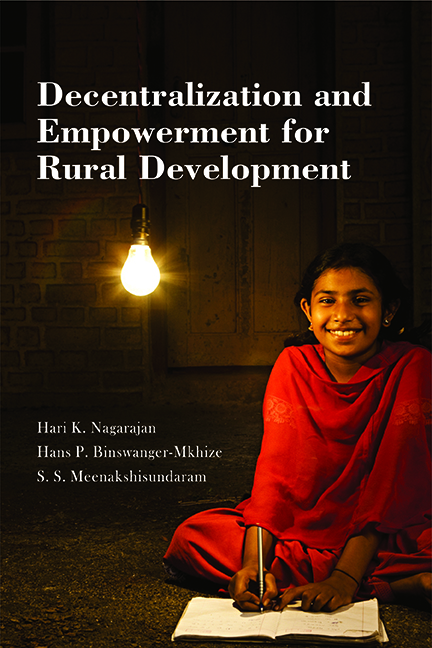Book contents
- Frontmatter
- Contents
- List of Tables and Figures
- Foreword 1
- Foreword 2
- Preface
- 1 Introduction
- 2 Decentralization: Cross-country Experiences
- 3 Thinking about Decentralization in India: 73rd Amendment and Beyond
- 4 Literature
- 5 An Overview of the Data
- 6 Analytical Approaches and Econometric Methods Used
- 7 Can Panchayats Improve the Quality of Services? Some Qualitative Evidence
- 8 Impact of Political Reservations for Women in Panchayats
- 9 Importance of Individual Empowerment of Women
- 10 Governance, Service Provision and Development Outcomes
- 11 The Impact of Fiscal Grants on Tax Efforts of Village Panchayats
- 12 Incidence of Identity-based Voting and Bribes in Panchayats
- 13 Panchayats and Household Vulnerability
- 14 Key Findings, Conclusions and Policy Recommendations
- References
- Index
- About the Authors
4 - Literature
Published online by Cambridge University Press: 30 November 2022
- Frontmatter
- Contents
- List of Tables and Figures
- Foreword 1
- Foreword 2
- Preface
- 1 Introduction
- 2 Decentralization: Cross-country Experiences
- 3 Thinking about Decentralization in India: 73rd Amendment and Beyond
- 4 Literature
- 5 An Overview of the Data
- 6 Analytical Approaches and Econometric Methods Used
- 7 Can Panchayats Improve the Quality of Services? Some Qualitative Evidence
- 8 Impact of Political Reservations for Women in Panchayats
- 9 Importance of Individual Empowerment of Women
- 10 Governance, Service Provision and Development Outcomes
- 11 The Impact of Fiscal Grants on Tax Efforts of Village Panchayats
- 12 Incidence of Identity-based Voting and Bribes in Panchayats
- 13 Panchayats and Household Vulnerability
- 14 Key Findings, Conclusions and Policy Recommendations
- References
- Index
- About the Authors
Summary
As seen in chapter 3, it has been 20 years since the landmark 73rd amendment to the Constitution of India. This amendment formalizes the local bodies and has put in place a range of powers that ought to be vested in them. There are a number of outcomes that are expected out of the various provisions. Since the passing of the amendment, a significant literature has emerged; one that attempts to evaluate both the need for decentralization as well as the types of outcomes due to decentralization. This chapter reviews the evidence in the extant literature about the functioning of panchayats and the progress of decentralization in India. The authors first look at the general functioning of local governance, social welfare and economic growth. This is followed by sections on provision of services; gender, caste and tribe and programme capture; the mechanisms and impacts of local democracy; localized planning; panchayat revenue-raising; the payment of bribes, and finally on transparency and accountability.
Common findings highlighted in these studies are the wide variations across states and panchayats in the features of local governance systems and the impacts of decentralization; the need for open and competitive political systems to realize the benefits of decentralization; the growing involvement of poor and vulnerable groups in the system; the significant improvements in local governance and delivery of services associated with reservations of political positions for women and SC/ST; the usefulness of parallel bodies such as village education committees to improve services; the superior educational achievements associated with private education; the powerful forces that favour capture of benefits, combined with the power of democratic governance such as elections, gram sabha meetings and political involvement of poor and vulnerable segments of the population to counteract the tendencies for programme capture and finally the low levels of revenue raising relative to village incomes. While many studies point to the steady but slow improvements in local governance, as a whole the studies present a mixed picture of the characteristics of local governance and the gains it has brought about.
Local governance, social welfare and economic growth
Democratic decentralization provides poor people with opportunities to play at least minimal and often non-so-minimal roles in the public sphere. Since decisions taken in elected bodies at lower levels affect everyone's material well being, popular awareness of politics increases, even among the most disadvantaged.
- Type
- Chapter
- Information
- Decentralization and Empowerment for Rural Development , pp. 71 - 95Publisher: Foundation BooksPrint publication year: 2014

